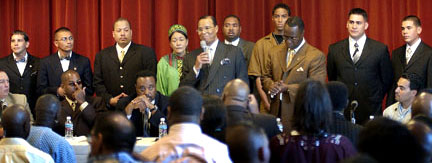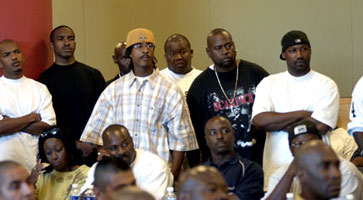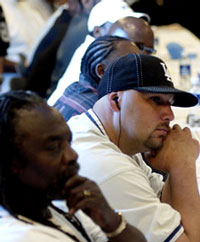
LOS ANGELES (FinalCall.com) – The coolness of the room belied the hot topic on the table for discussion at the first quarterly meeting of the Southern California Gang Intervention Summit June 20. As tensions between Latino and Black youth and young adults continue to swell in the California sun, nearly 300 grassroots leaders of the gang intervention community assembled to begin serious discussions on, not the problem, but local solutions.

“We believe that you have the stories from the streets, from your work that you have been doing on the campuses,” Tony Massengale, co-director of the Unity Collaborative, told the group. “Intervention in the best condition to begin to be a part of the solution,” he added, expressing that he had stopped participating in most community meetings because he was tired of listening to statistics and academic writings. “We must recognize the need for communication among ourselves,” he insisted.
This need was recognized by members of two warring street organizations, who attended the summit looking to dialogue on putting down their beef. The day was about handling business. Defining clearly that the summit was not a media event, the collaborative of activists invited the Honorable Minister Farrakhan to deliver a message of guidance during the meeting as part of his scheduled visit to the city. That invitation was prompted by Stan Muhammad, executive director of Venice 2000 and the lead organizer of the HELPER Alliance, an alliance of gang intervention groups, who helped organize the summit, which marked the beginning of an organizing process for action. Follow-up dialogues between the street organizations is in the works.
Among the 50 organizations walking their talk on the frontlines were All People’s Church, Amer-I-Can Foundation for Social Change, Association of Community-Based Gang Intervention Workers, Aztec Fire Fighters, Big Homies Foundation, Communities In Schools, Community Self-Determination Institute, Gangsters Anonymous, Homeboy Industries, Homies Unidos, Los Angeles Bridges, NO GUNS, Pico Youth & Family Center, Project 10/West Angeles Church-COGIC, Sidewalk University, Stop the Violence, Increase the Peace Foundation, Streetgangs.com, Toberman Settlement House, Unity Collaborative, Violence Prevention Coalition, Watts Century Latino Organization and We Care Outreach.
Identifying solutions can only be effective by identifying the root of the problem, stressed Oscar de la Torre, who runs the People, Youth and Family Center.
“What are White people’s role in this Black/Brown tension?” he asked. “It is easy to look at the symptom and not the root of the problem.”

Mr. de la Torre has also developed a curriculum that teaches the common history and struggle of Latino and Black peoples and facilitates the city’s Days of Dialogue. “I have found that we have more in common than in difference in working for social justice. We must build unity and teach our youth that we have a common agenda and common social struggle,” he shared, as he recounted a brief overview of the presence of Afro-Mestizos in Mexico, and the history of a slave rebel, Yanga, who fought the Spaniards for Mexican independence.
“Every time there has been oppression, our people have worked together to fight that oppression–the imperialism and colonialism that still continues today,” he said, pointing out that “we have needed agencies to keep us safe from the police,” as an example.
He also believes that the problem stems from “an education system that has been incapable of teaching our people” and “the divide and conquer strategy in the prison system that they have ultilized for so many years.”
Western Regional Minister Tony Muhammad informed the audience of the recent visit to San Quentin Prison death row to speak with Stanley “Tookie” Williams, co-founder of the Crips, who has transformed his life during his incarceration, and now works to establish peace in his streets through his writings and messages. The audience listened to two audio taped messages Mr. Williams recorded for the meeting.
“We have a lot of hurt and pain and we are not here to discard that. Any unity is going to take struggle and pain,” Min. Tony said in his remarks during the summit, after the tapes played. “We are fighting with a deeper demon within self,” he explained, repeating Mr. Williams’ words. “And once we can conquer that, we can conquer anything,” he concluded.
Latino street activist Jasiri Muhammad told The Final Call that the summit emerged out of a need that gang members felt. “We realize that we could keep killing and killing and killing, but who’s going to win? We can kill a million people and nothing will change or make anyone happier,” he insisted. “A couple of critical thinkers out of our neighborhoods started talking about some things, and come to find out, the majority of everybody feels this way.”
During the question and answer session following Minister Farrakhan’s remarks, one Brother stressed the need to “be in each other’s faces more, not one meeting every year or every month,” so that way they could “see the brotherhood inside of each other.”
Community activist Hector Perez Pacheco emphasized the need for action to follow the meeting. “It’s important that we take from these concepts and bring it into practice and just work on trying to bring unity for the survival of our communities,” he said.
Rock The Vote! spokesperson and 100.3 The Beat personality Niele Anderson believes the summit answered a cry for help from the street organizations. “This hope, that they are receiving today, can bless them for a beautiful future,” she observed. “That’s all Black and Brown people need–hope that we can make it, provide for our families,” she pointed out.
Shonteze Williams, a member of the Unity Three gang intervention and prevention collaborative, reiterated the pressing need to move forward and bring resolution to the simmering tensions. “It’s time to move forward on the issue of the Black and Brown. From the street level, the question is being asked, ‘How can we attack the Black and Brown issue when we can’t even attack the issue of Black on Black?’ I totally stand behind what the Minister said, we must clean up each backyard first, and then begin to work on the issues with each other.”
As a result of several gang members delivering passionate appeals to end the violence, a private dialogue branched off in another room, prior to the summit ending, with about 80 gang members dealing with issues on their chests with one another.
“We’re just trying to start these things. They’re not saying that they’re putting their guns down,” Bro. Jasiri hopefully informed, “at the same time, we’re starting this dialogue with one another so that eventually, the little ball that rolls down the hill turns into a big snowball at the end.
Charlene Muhammad contributed to this report.












